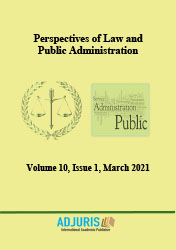SEPARATION OF POWERS AND STATE INSTITUTIONS SUPPORTING DEMOCRACY: DOES SOUTH AFRICA HAVE A “FOURTH BRANCH” PAR EXCELLENCE?
SEPARATION OF POWERS AND STATE INSTITUTIONS SUPPORTING DEMOCRACY: DOES SOUTH AFRICA HAVE A “FOURTH BRANCH” PAR EXCELLENCE?
Author(s): Hoolo NyaneSubject(s): Constitutional Law, Public Law, Government/Political systems, Politics and law
Published by: Societatea de Stiinte Juridice si Administrative
Keywords: separation of powers; state institutions supporting democracy; fourth branch; constitutionalism; Constitution of South Africa;
Summary/Abstract: The Constitution of South Africa establishes a cluster of institutions styled "state institutions supporting democracy", also called "Chapter 9 institutions", as they are created under Chapter 9 of the Constitution. These institutions exist alongside the traditional three branches of government – the executive, the legislature and the judiciary. They are independent, and they have powers over the traditional branches of government. There is tension between these "Chapter 9 institutions" and the traditional branches of government in recent times. At the centre of this tension lies a more substantial question about the place occupied by these institutions in the organisation of the state. Put differently, can it be said that South Africa has a constitutional scheme that includes a "fourth branch" of government? This paper sets out to investigate this question. Ultimately, the article contends that these oversight institutions have consolidated themselves into what may be styled the "fourth branch" of the state.
Journal: Perspectives of Law and Public Administration
- Issue Year: 10/2021
- Issue No: 1
- Page Range: 188-202
- Page Count: 15
- Language: English

